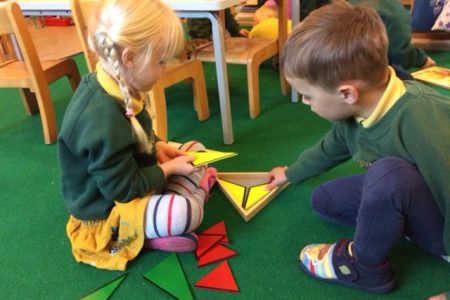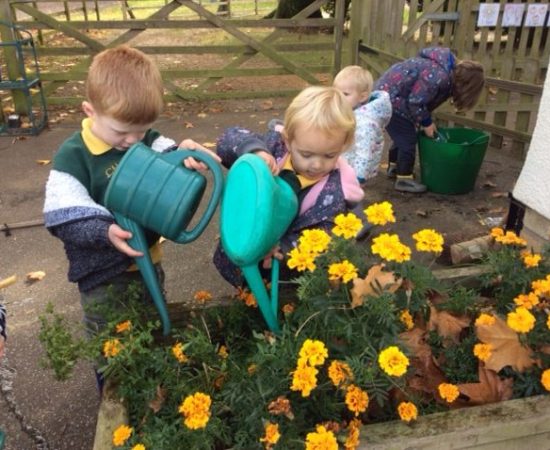

Dr Maria Montessori (1870 – 1952) was one of the first female Italian doctors and believed that children have an ‘inner self’ and teach themselves at their own pace and by their own experience.
Children are encouraged to work individually or in small groups concentrating on their interests, within the special structured environment. The beautiful materials provide a graded set of activities for the children to work with.

The Montessori Method is a unique and highly successful method of teaching based on the development of the child’s innate love of learning. It’s philosophy recognizes the immense capacity of children to absorb information when given the freedom and independence to learn at their own pace.
This approach encourages the child to enjoy the process of learning and therefore differs from the ‘failure to keep up’ approach of typical teaching environments. At the same time it also gives the freedom for high achievers to progress at their own pace, without being artificially held back.
The Montessori approach understands that focusing on the individual child and allowing them to develop at their own pace translates into confidence, successful life-skills and an immense joy in learning. These life-skills continue in the child’s education and indeed throughout their adult lives.
The typical Montessori classroom is a very carefully prepared school environment with specific activities which both educate and refine the child’s senses while enhancing their understanding of the world around them. They are usually bright, spacious and ordered with activities arranged in each area of learning and sequentially.
This environment functions by allowing the child to develop independently in all areas of learning according to his or her inner psychological and motivational needs. The learning activities are freely available for the children to learn and explore, creating a dynamic learning process guided and encouraged by the qualified Montessori teacher.
Maria Montessori was the first medical practitioner to discover that children are innately interested in learning about the world around them and through their natural curiosity are able to develop themselves. By providing an environment that supports natural development, Montessori education enables children to develop the fundamental capacities that they need to become happy and fulfilled adults who contribute to society.
Mixed age groups which offer a wide range of activities to spark children’s interest and enable children to learn from others and learn by helping others.
Freedom for children to work at their own pace, without interruption, choosing from a range of activities that are developmentally challenging and appropriate.
Self discovery and exploration is encouraged so that children find things out for themselves, make mistakes and correct them independently.
Respect for each child as an individual personality with unique talents.
Kindness and respect for others, the community and the environment.

At Chives Montessori our trained teachers have a deep understanding of child development and are experts at guiding children towards productive and challenging experiences, both individually and collectively. This provides a firm foundation for their future with kindness and respect.
All Montessori nurseries and schools are assessed to the same Ofsted criteria as mainstream schools and generally match or exceed those standards.
Montessori education focuses on six core areas of learning: Language, Practical Life, Mathematical, Cultural, Creative and Sensorial and approaches these in a far broader way than traditional state curriculums.
The Montessori Method uses finely tuned activities and specially designed equipment to encourage and develop learning as opposed to a teacher simply trying to transfer their knowledge to a whole class.
Montessori classrooms maintain a non-competitive environment accommodating the children’s own desire for learning as motivation. This is encouraged and directed by the Montessori teacher.
The concept of self-discipline is central to the Montessori ethos and as this is developed in children it leads to individuals who are independent, confident and enjoy learning in whatever environment they find themselves in.
Montessori places great emphasis on social values, culture and respect for others. Cooperation and collaboration is key both to a Montessori education and also for the challenges of the modern world.
Directresses are especially trained to observe and to respond to the needs of each child and to direct the whole group. They do not teach in the traditional sense, but rather guide or direct each child forward.

© Chives Montessori School 2022 tel: 01473 212448